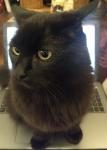
In the last CIEP blog post of 2018, the Wise Owls are out in force to share their appreciation for that must-have item for every freelance editor or proofreader: an office companion.
 Hazel Bird
Hazel Bird
Since she arrived in 2015, my furry office companion (Darcy) has been mostly unassistive in her contributions to our joint workspace. She is excellent at identifying the correct use of words such as ‘biscuit’, ‘frisbee’, ‘lunch’ and (slightly more unusually) ‘teeth’. However, she is less good at tasks such as fixing problems with commas or chasing authors’ corrections. She excels at carrying out requests to find the human editorial assistant (generally in his office at the other end of the house). However, she is less adept at conveying any useful information to him or bringing him back with her, if required.
She has many admirable qualities to make up for these professional deficiencies, however. Although she will happily abandon me if there may be food on offer elsewhere, she is generally stalwart, usually being found in a bed next to my desk. Being a cockapoo and thus only slightly less energetic than a tornado, she also requires regular walks – a huge benefit for someone who otherwise has a tendency to become absorbed in her work and forget to move for hours on end.
Overall, during her three years of employment as chief editorial assistant, Darcy has done little to fulfil her job description. She has also probably destroyed more resources than she has generated for the business, having a talent for rendering almost any toy unsafe within an hour or so of receiving it. However, on balance, her positive qualities do outweigh her lack of editorial acumen, so she will likely stay in her role for the foreseeable future.
 Louise Bolotin*
Louise Bolotin*
For many years, my faithful office companion was Nelson, a pedigree British shorthair with blue tabby fur like velvet and huge green eyes. He was cute, adorable and largely quiet, which was a blessing when I needed to be deep in thought. Since his passing two years ago, I have two office companions. One is silence, the other noise. I must have silence when concentrating on the trickiest of edits. But I also must have music – I’ve been listening to music all my life and it’s as essential as eating for me.
You could say my go-to office companion now is Spotify. Much as I love to sing along to tracks, I find lyrics a massive distraction when working, so anything I play must be instrumental. I have some classical favourites – Smetana’s Ma Vlast and Rodrigo’s Concerto de Aranjuez are regularly on my virtual decks, for example. But my true love is reggae and I turn to the heaviest of heavy dub for satisfaction without vocals. It’s rhythmic and soothing, not too fast and typically has
60–90 beats per minute, perfectly matching a healthy heart rate. I’ve been listening to Joe Gibbs’ African Reggae since the late 70s and it never fails for me. Other dub albums are available, as they say.
 Margaret Hunter
Margaret Hunter
I wasn’t going to contribute to this Wise Owls offering. I don’t need office companions, I thought. In fact, I love working on my own, able to get on with things just as I want, whenever I want, without people interfering or chatting or just generally being there.
But then I realised I’m not a total recluse. Freelance editors’ social media pages regularly feature office companions of the furry, purring, woofing (farting??) kind, but I don’t have a pet. I have Monkey (yes, I know he’s not…). He’s not great at conversation though; but he is there if I want a friendly ear to rant at.
And then there are the birds outside my window, who seem to get through seed as fast as I’m daft enough to keep filling it up. Yes… I need a window onto the natural world, and the birds, well, they make me happy.
But really my true companions are my CIEP colleagues. Maybe we rarely say the words out loud, but we’re having conversations all the time on the forums, on social media and via email. And just sometimes we meet in person.
So, I do have companions, human and otherwise. Without them this freelance editing lark would definitely be a much harder and lonelier slog.
 Melanie Thompson
Melanie Thompson
I literally would not be here without my Office Assistant, Matty. When I say ‘here’ I mean, in the village where I live – because a major reason for moving here was the fantastic local (dog-)walking. When I say ‘here’ I also mean ‘being a freelance editor’ – because if I hadn’t needed to stay at home to keep him company I may well have been tempted to take an office job a few years ago. And when I say ‘here’ I also mean ‘at my desk’ – because now he is an old dog and has very set habits. If I don’t say ‘let’s go to work’ and unlock my office door in the morning he looks very confused.
Having an office companion is a joy, but it’s also a job. Being a pet’s ‘parent’ brings responsibilities – and expense. So the yellow Dogs Trust stickers are absolutely right: a pet is for life, not just for Christmas. If you’re thinking of getting a pet, my top tips are: get good ‘lifetime’ pet insurance (Direct Line have been brilliant for us), and find local friends or professionals who can pet sit when needed.
Matty often features on my Facebook page and in my annual newsletter to clients. He’s about to notch up his 13th Christmas in his role as Office Assistant. He’ll be getting an annual bonus (extra fish-skin treats). He has certainly earned it: all those hours of waiting patiently while I’m tapping on a keyboard; the twice-daily compulsory walks that often help me think through knotty editing problems; and helping me to get to know so many of my neighbours and all the local delivery people!
As I type, he’s starting the ‘4:30 whine-up’ … it’s nearly dinner time. Long may his daily commute continue.
 Mike Faulkner
Mike Faulkner
My office/shed is in the woods in deepest Argyll, so I am spoiled for choice when it comes to local fauna for company – regular passers- by are roe deer, pine martens and red squirrels. I haven’t managed to get a pic of one of the deer, but these two chaps come almost every day.
by are roe deer, pine martens and red squirrels. I haven’t managed to get a pic of one of the deer, but these two chaps come almost every day.
We live in fear that one day Piñon the pine marten is going to catch Squirl the squirrel (I know …), but so far Squirl has been way too fast and agile – h e can reach parts of the tree that are beyond Piñon’s wildest dreams, and he doesn’t seem put out by the odd stand-off.
e can reach parts of the tree that are beyond Piñon’s wildest dreams, and he doesn’t seem put out by the odd stand-off.
Eddie watches them through the window when he isn’t on LinkedIn.
Nik Prowse
I don’t have any pets, although sometimes I think it would be nice to own a dog to warm my feet in winter. But when I think about what keeps me company in the office it’s invariably music.
I can’t edit to music – I just can’t concentrate on copy-editing with any background noise. But running an editorial business, and even working through the necessary tasks required to get a book manuscript back to the publisher, involves far more than just copy-editing. For the extra tasks, especially the mundane ones, I find background music helps my concentration hugely.
In the main, if I need music for concentration I choose ambient electronica. Ambient music often eschews normal song structure to create tracks that vary in length, sound and atmosphere a great deal. Once you get away from the idea that songs need words or instruments … or even a discernible structure … there’s a lot to discover! I find ambient music incredibly good for the concentration (except while editing, as I’ve said). Often referred to in a derogatory way as ‘wallpaper music’, for my purposes this is the point: it’s meant to be unobtrusive and in the background.
One of my current worktime favourites is by Carbon Based Lifeforms. Derelicts takes me back to the sounds of Vangelis or Jean Michel Jarre in the early 80s, and it’s a very soothing soundtrack for those more mundane office tasks.
 Sue Littleford
Sue Littleford
Hurrah for arctophilia! Much as I miss my darling cats, they did have a habit of sitting on the keyboard at awkward moments, or sticking their butts in my face and walloping me with their tails: endearing out-of-hours but not so much on deadline. Teddies are much better behaved. My tribe is divided into bedroom bears and office bears and currently stands fifteen strong. The ten office bears stand (well, sit) guard and (over)fill my partner’s desk, as there’s no room on mine, but just for you, I had a bit of a tidy-up and you can see my guys (and one gal) in all their office-duty glory. The gal – Genevieve from Geneva – is a genuine work bear as she came home with me from a visit to a client.
 The office bears are a very supportive bunch – they agree with all my decisions, commiserate when a manuscript turns out to be a bit of a ’mare, cheer when an invoice goes out and cheer even more when the invoice is paid. Decorative and decorous (no teddy butts in my face), each one is a delight. My bear from babyhood, Pinky, is retired (being more grey than pink, these days). You can see them all looking forward to a crisp winter! Season’s greetings from Pinky (he claimed seniority so must come first in the list), Arthur, Basil, Genevieve, Gerald, Hank, Harry, Kristoff, Little Binky, Marius, Robin, Rodney, Rudy, Siggy and Snowball.
The office bears are a very supportive bunch – they agree with all my decisions, commiserate when a manuscript turns out to be a bit of a ’mare, cheer when an invoice goes out and cheer even more when the invoice is paid. Decorative and decorous (no teddy butts in my face), each one is a delight. My bear from babyhood, Pinky, is retired (being more grey than pink, these days). You can see them all looking forward to a crisp winter! Season’s greetings from Pinky (he claimed seniority so must come first in the list), Arthur, Basil, Genevieve, Gerald, Hank, Harry, Kristoff, Little Binky, Marius, Robin, Rodney, Rudy, Siggy and Snowball.
 Sue Browning
Sue Browning
This is Pip, my office companion or, perhaps more accurately, my out-of-office companion, as she rarely ventures into my office (it’s tiny), only sheltering here when there’s serious bike fixing going on downstairs, involving Many Bad Words.
She was a rescue dog, and very timid. When she came to us, aged 5 months, she was afraid of people, dogs, cats, horses, cows, fireworks, gunshots, loud noises in general, and plastic bags. Now, after nearly 11 years of careful and loving nurture, I’m delighted to say she is no longer afraid of plastic bags.
She may not be my in-office companion, but she plays a vital role in my working life, making sure I get exercise and fresh air every day. I love her dearly, and wouldn’t be without her.
*Louise Bolotin died in October 2022; her contributions are much missed.
Posted by Abi Saffrey, CIEP blog coordinator,  and Gaston, supreme office overlord.
and Gaston, supreme office overlord.
The views expressed here do not necessarily reflect those of the CIEP.




